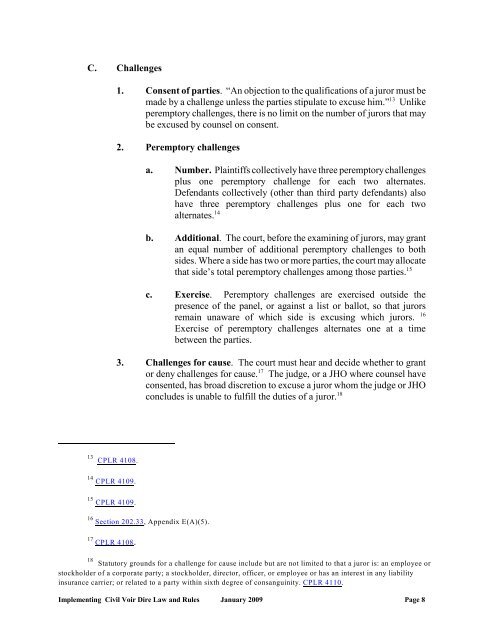IMPLEMENTING NEW YORK'S CIVIL VOIR DIRE LAW AND RULES
IMPLEMENTING NEW YORK'S CIVIL VOIR DIRE LAW AND RULES
IMPLEMENTING NEW YORK'S CIVIL VOIR DIRE LAW AND RULES
You also want an ePaper? Increase the reach of your titles
YUMPU automatically turns print PDFs into web optimized ePapers that Google loves.
C. Challenges<br />
1. Consent of parties. “An objection to the qualifications of a juror must be<br />
13<br />
made by a challenge unless the parties stipulate to excuse him.” Unlike<br />
peremptory challenges, there is no limit on the number of jurors that may<br />
be excused by counsel on consent.<br />
2. Peremptory challenges<br />
a. Number. Plaintiffs collectively have three peremptory challenges<br />
plus one peremptory challenge for each two alternates.<br />
Defendants collectively (other than third party defendants) also<br />
have three peremptory challenges plus one for each two<br />
alternates.<br />
14<br />
b. Additional. The court, before the examining of jurors, may grant<br />
an equal number of additional peremptory challenges to both<br />
sides. Where a side has two or more parties, the court may allocate<br />
that side’s total peremptory challenges among those parties. 15<br />
c. Exercise. Peremptory challenges are exercised outside the<br />
presence of the panel, or against a list or ballot, so that jurors<br />
remain unaware of which side is excusing which jurors. 16<br />
Exercise of peremptory challenges alternates one at a time<br />
between the parties.<br />
3. Challenges for cause. The court must hear and decide whether to grant<br />
17<br />
or deny challenges for cause. The judge, or a JHO where counsel have<br />
consented, has broad discretion to excuse a juror whom the judge or JHO<br />
concludes is unable to fulfill the duties of a juror. 18<br />
13 CPLR 4108.<br />
14 CPLR 4109.<br />
15 CPLR 4109.<br />
16 Section 202.33, Appendix E(A)(5).<br />
17 CPLR 4108.<br />
18<br />
Statutory grounds for a challenge for cause include but are not limited to that a juror is: an employee or<br />
stockholder of a corporate party; a stockholder, director, officer, or employee or has an interest in any liability<br />
insurance carrier; or related to a party within sixth degree of consanguinity. CPLR 4110.<br />
Implementing Civil Voir Dire Law and Rules January 2009 Page 8

















